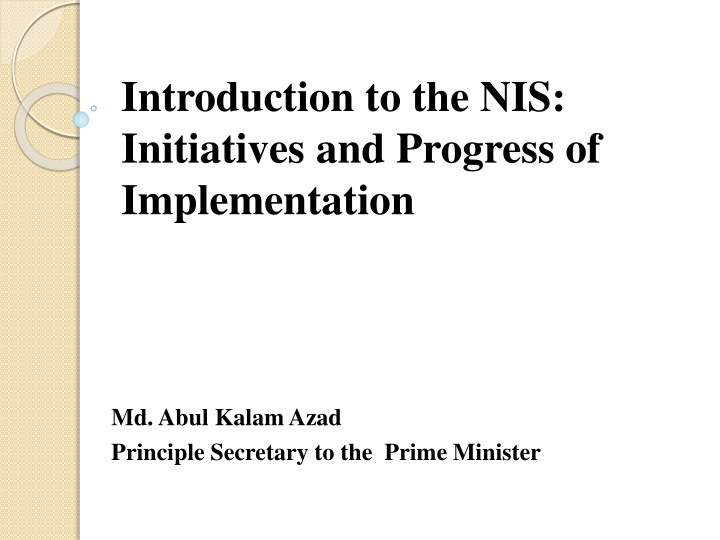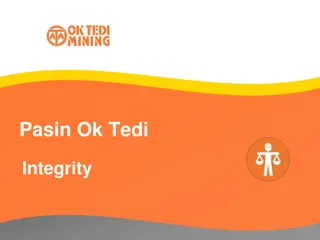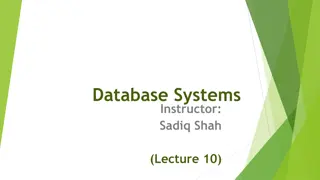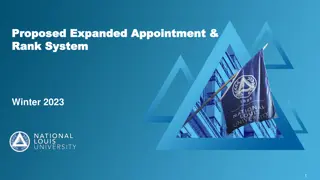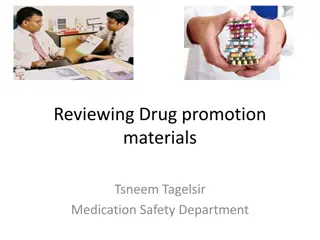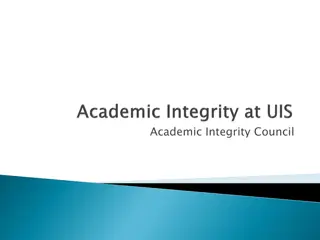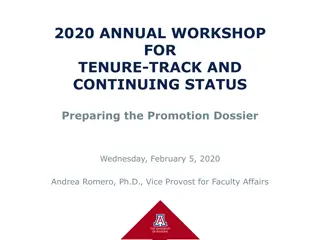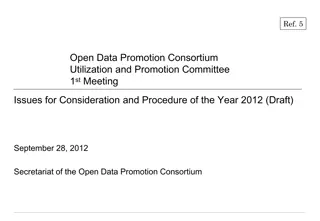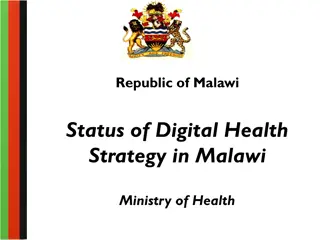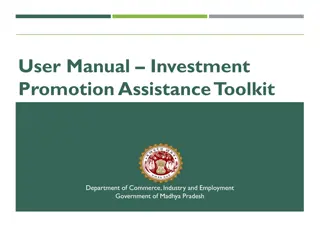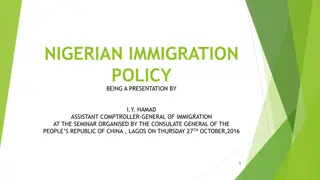Progress of NIS Implementation and Integrity Promotion Strategy
Promoting integrity and preventing corruption are key initiatives of the National Integrity Strategy (NIS), aimed at establishing good governance for a prosperous society in Golden Bengal. The document outlines the vision, mission, goals, and concept of integrity, along with previous measures and the rationale for adopting the NIS. Various regulatory measures and interventions have been highlighted to combat corruption effectively.
Download Presentation

Please find below an Image/Link to download the presentation.
The content on the website is provided AS IS for your information and personal use only. It may not be sold, licensed, or shared on other websites without obtaining consent from the author.If you encounter any issues during the download, it is possible that the publisher has removed the file from their server.
You are allowed to download the files provided on this website for personal or commercial use, subject to the condition that they are used lawfully. All files are the property of their respective owners.
The content on the website is provided AS IS for your information and personal use only. It may not be sold, licensed, or shared on other websites without obtaining consent from the author.
E N D
Presentation Transcript
Introduction to the NIS: Initiatives and Progress of Implementation Md. Abul KalamAzad Principle Secretary to the Prime Minister
What is NIS? A promoting promotion of integrity and prevention of corruption national strategy good document for governance through
Vision, Mission of the NIS Vision: A happy and prosperous Golden Bengal Mission: Establishment of good governance in state and society
Goal: Establishment of a transparent executive organ of the State, which is responsive to the demands and needs of people.
Concept of Integrity Synonyms of integrity: honesty, probity, rectitude, ethics, morals, righteousness,morality,honor,good character, principles, virtue, scrupulousness, sincerity, trustworthiness Integrity in this document means: behavioural excellence morality and honesty; and adherence to time-tested norms, values, customs and principles of a society; decency, fairness, truthfulness, influenced by
Previous Measures towards Integrity Spirit of the Constitution:A just and righteous society; Combating corruption has been a continuous effort. For example: Penal Code, 1860; Prevention of Corruption Act, 1947; Government Servant (Conduct) Rules, 1979; Government Servant (Discipline & Appeal) Rules, 1985; Reorganization of the ACC, 2004; Public Procurement Act/ Rules, 2006/2008; Right to Information Act, 2009; Whistle-blowers Protection Act, 2011; Prevention of Money Laundering Act, 2012.
Rationale for Adopting NIS Need for coordination among different regulatory measures and interventions; Development interventions of Government and NGOs have grown extensively; Corruption identified Government Policy documents: Sixth Five Year Plan 2011-15 Perspective Plan of Bangladesh 2010-21 United Nations Convention (UNCAC) requires formulation of a Strategy to fight corruption. as a major concern in Against Corruption
Article 5. Preventive anti-corruption policies and practices 1. Each State Party shall, in accordance with the fundamental principles of its legal system, develop and implement or maintain effective, coordinated policies that promote the participation of society and principles of the rule of law, proper management of public affairs and public property, integrity, accountability. anti-corruption reflect the transparency and 2. Each State Party shall endeavor to establish and promote effective practices aimed at the prevention of corruption.
Institutions of NIS State Institutions 1. 2. 3. 4. 5. 6. 7. 8. 9. 10. Local Government Executives and Public Administration Parliament Judiciary Election Commission Office of Attorney General Public Service Commission Office of Comptroller and Auditor General Ombudsman Anti-Corruption Commission
Institutions of NIS(cont.) Non-State Institutions 1. 2. 3. 4. 5. 6. Political parties Private sector NGO / Civil Society Educational Institutions Media Family
Strategy for Attaining Integrity Identification the contexts and challenges faced by different state and non-state institutions; Sets goals of the institutions to ensure integrity; Makes short, medium & log-term recommendations for achieving the goals; Suggests time-bound action plan for implementation of these recommendations Short term - 1 year, medium term - 3 years, long term - 5 years.
Executive Organ and Public Administration Challenges: Promulgation of a Civil Service Act; Increasing functional freedom of public services with accountability; Enhancing efficiency and effectiveness; Establishing links between promotion, transfer, pay and emoluments with appraised performance; Introduction of a competitive pay and incentive structure; Overall reform by ensuring equitable opportunities for different cadre services; Building citizen-friendly enforcement agencies; Fair, neutral and visible decision-making.
Executive Organ and Public Administration (Cont.) Short-term Recommendations Making systemic arrangements for submission of asset statements; Proper enforcement of Whistle Blowers Protection Act; Dealing with grievances by operationalising the Grievance Redress System ; Introduction of modern performance appraisal, incentive and emolument systems; Ensuring appointment of government officers and employees on a regular basis.
Executive Organ and Public Administration Medium and Long term Recommendations (Cont.) Enactment of Civil Service Act; Establishment of an efficient, accountable, qualified and responsive executive organ by ensuring career development ; Providing in-service training for developing capacity; Introduction of a competitive promotion system based on a combination of seniority, merit, efficiency and performance; Expansion of e-governance system; Framing a just pay-structure for the public servants with provisions for adjustments with cost of living.
Major Recommendations of the NIS (Cont.) Enactment of Civil Service Act; Making systemic arrangements for submission of asset statements; Operationalising the Grievance Redress System ; Introduction of modern performance appraisal, incentive and emolument systems; Providing in-service training for developing capacity; Expansion of e-governance system; Framing a just pay-structure for the public servants with provisions for adjustments with cost of living.
Executive Organ and Public Administration Action Plan Sl. Interventions Performance Indicator 1. Enactment of Civil Service Act enacted Time- frame Mediu m term Responsibility Supported by Civil Service law Ministry of Public Administration Ministry of Public Administration Legislative and Parliamentary Affairs Division Cabinet Division 2 Formulation of Career Plan Career Plan formulated; transparency established and fairness ensured in promotion Newly formulated system followed Mediu m term 3. Introduction of participatory appraisal system Regular submission of income and asset statements to specified authorities Better pay and facilities for officers and employees Short term Ministry of Public Administration Ministry of Public Administration All other Ministries/ Divisions All other Ministries/ Divisions 4. Statements submitted on a regular basis Short term 5. Establishment of permanent Pay and Service Commission Long term Finance Division Cabinet Division
Executive Organ and Public Administration Action Plan Sl. Interventions Performance Indicator a) ICT introduced and used in all Min/Div; (b) volume and quality of services increased and improved by ICT use Each public office has a GRS focal point and is publicly known Min/Div divided in clusters, gazette notified Whistle Blowers (Protection) Act, 2011; enforced Law published in the official Gazette Time- frame Short term Responsibility Supported by 6. Establishment of ICT for introduction of e- governance Ministry of Information and Communication Technology Cabinet Division 7. Introduction of Complaint Management Clustering of Ministries/ Divisions Enactment of Whistle Blowers (Protection) Act 10. Establishment of separate agency for investigation 11. Modernisation of land management and implementation of Land Use Plan 12. Strict handling of marketing of adulterated food, medicine and goods Short term Cabinet Division All other Ministries/ Divisions Cabinet Div; All Min/Div Cabinet Division 8. Long term Implem ented Ministry of Public Administration Legislative and Parliamentary Affairs Division Ministry of Home Affairs 9. Short term Legislative and Parliamentary Affairs Division Ministry of Public Administration Digitised land management system established Medium term Ministry of Land Adulteration Act enforced Short term/ continuo usly BSTI, Ministry of Industries Ministry of Home Affairs
Major Recommendations of the NIS Capacity development of the ACC and ensuring independence of ACC; Ensuring neutrality and enhancing accountability of the Commission Raising awareness among government organisations, businesses, civil society and media on corruption Capacity Development of the elected representatives, officers and employees of LGs Introduction of Local Government Service Protecting consumers rights;
Major Recommendations of the NIS Promotion of enhanced transparency in NGO functioning Avoidance of duplication and overlap in the interventions of the Government and NGOs Encouraging and supporting the children and youths participating in voluntary, patriotic and welfare activities Promotion of Ethics in academic education; Strengthening Press Council; Promotion of integrity in the media; Proper implementation of the Right to Information Act;
Implementation Arrangement Arrangement in Section Four: Brief and flexible arrangement Self initiative considering high importance of integrity Coordinated by the executive Approach: 1. Development of administrative system and process 2. Development skills of officials 3. Regulatory and administrative reforms 4. Monitoring and evaluation 5. Award for the best practitioners
Implementation Arrangement Institutional Arrangements 1. Central Level: National Integrity Advisory Council; Executive Committee of the Council; National Integrity Implementation Unit (NIIU Cabinet Division); 2. Ministry Level: Ethics Committee at every Ministry/Division and Institutions; Focal Point for every Ethics Committee; 3. NGO and Private Sector: NOGAB and M/O Commerce (Preparation of Guideline)
Ethics Committee Headed by the Secretary in Ministry/Division Head / 2nd man in NIS Institutions; Heads of extension departments members; Member Secretary is the focal point ; ToR for Ethics Committee: Identification of challenges of promotion of integrity and good governance; Prepare time-bound work-plan to overcome challenges; Fixing responsibilities for implementation of the work- plan; Monitoring implementation of work-plan; Reporting to the NIIU on progress
Ethics Committee (work plan) Stakeholders meeting Identify governance challenges Prepare individual work- plan RTI>GRS>E- governance>skills Include new activities Revise work-plan Share experiences Actio n Plan Check DO Distribute responsibilities Provide necessary budget Implement plan/activities Conduct regular Ethics Committee meeting Monitor and evaluate implementation
Progress of NIS Implementation Dissemination of the NIS Ethics Committees are functioning Ministries/Divisions prepared work-plans Focus on RTI, E-governance, GRS increased Training and capacity development initiatives increased Annual Performance Management System introduced Sub-committee formed in priority areas NIS Support Project started with technical assistance from JICA
Potentials of the NIS Constitutional responsibility of the state to promote good governance Most of the contemporary issues that affect governance are included Reformative, not revolutionary Reflection of a positive intention of the Government Bringing the good governance agenda in the front Increasing demand for good governance
Possible initiatives of the Ministries Integrity as a thought-provoking and critical issue of governance among officials Involve officials in creative activities on integrity and governance (exercise, souvenir, cultural and literary activities etc.) Introduce successful initiatives and legendary personalities on integrity and honesty Encourage leadership development, self-initiatives and innovation for good governance Feedback and recommendations to NIIU
Way Forward Involving citizens and stakeholders Effective coordination among institutions for synergy Focused activities within the watch-dog institutions Promoting good practices Prioritizing service delivery
